2011 Toyota Camry Tires & Services
Get Started
Complete Auto Care for Your 2011 Toyota Camry
-
TIRES FOR YOUR 2011 Toyota Camry View Tire Info GET TIRE PRICING
-
REPAIR FOR YOUR 2011 Toyota Camry View Repair Info SCHEDULE REPAIR
-
MAINTENANCE FOR YOUR 2011 Toyota Camry View Maintenance Info SCHEDULE MAINTENANCE
-
OFFERS FOR YOUR 2011 Toyota Camry Limited Time Tire Offers VIEW ALL COUPONS
2011 Toyota Camry Tires
Recommended Tires | Tire Information
2011 Toyota Camry Tires Sizes, Speed Ratings, and Inflation
Not sure about your 2011 Toyota Camry tire size? Use the following chart to find information on tire size, speed rating, and inflation.
| Trim Level | Speed Rating | Inflation in PSI F/R | Tire Size |
|---|---|---|---|
| 2011 Toyota Camry LE* | V | 34 PSI/34 PSI | P215/60R16 |
| 2011 Toyota Camry LE* | V | 34 PSI/34 PSI | P215/60R16 |
| 2011 Toyota Camry LE* | V | 30 PSI/30 PSI | P215/60R16 |
| 2011 Toyota Camry LE* | V | 30 PSI/30 PSI | P215/60R16 |
| 2011 Toyota Camry Base* | V | 34 PSI/34 PSI | P215/60R16 |
| 2011 Toyota Camry Base* | V | 34 PSI/34 PSI | P215/60R16 |
| 2011 Toyota Camry SE* | V | 32 PSI/32 PSI | P215/55R17 |
| 2011 Toyota Camry SE* | V | 32 PSI/32 PSI | P215/55R17 |
| 2011 Toyota Camry Hybrid* | V | 32 PSI/32 PSI | P215/60R16 |
| 2011 Toyota Camry Hybrid* | V | 32 PSI/32 PSI | P215/60R16 |
| 2011 Toyota Camry XLE* | V | 30 PSI/30 PSI | P215/60R16 |
| 2011 Toyota Camry XLE* | V | 30 PSI/30 PSI | P215/60R16 |
| 2011 Toyota Camry XLE* | V | 34 PSI/34 PSI | P215/60R16 |
| 2011 Toyota Camry XLE* | V | 34 PSI/34 PSI | P215/60R16 |
|
2011 Toyota Camry LE* Speed Rating: V Inflation F/R: 34 PSI/34 PSI |
|
2011 Toyota Camry LE* Speed Rating: V Inflation F/R: 34 PSI/34 PSI |
|
2011 Toyota Camry LE* Speed Rating: V Inflation F/R: 30 PSI/30 PSI |
|
2011 Toyota Camry LE* Speed Rating: V Inflation F/R: 30 PSI/30 PSI |
|
2011 Toyota Camry Base* Speed Rating: V Inflation F/R: 34 PSI/34 PSI |
|
2011 Toyota Camry Base* Speed Rating: V Inflation F/R: 34 PSI/34 PSI |
|
2011 Toyota Camry SE* Speed Rating: V Inflation F/R: 32 PSI/32 PSI |
|
2011 Toyota Camry SE* Speed Rating: V Inflation F/R: 32 PSI/32 PSI |
|
2011 Toyota Camry Hybrid* Speed Rating: V Inflation F/R: 32 PSI/32 PSI |
|
2011 Toyota Camry Hybrid* Speed Rating: V Inflation F/R: 32 PSI/32 PSI |
|
2011 Toyota Camry XLE* Speed Rating: V Inflation F/R: 30 PSI/30 PSI |
|
2011 Toyota Camry XLE* Speed Rating: V Inflation F/R: 30 PSI/30 PSI |
|
2011 Toyota Camry XLE* Speed Rating: V Inflation F/R: 34 PSI/34 PSI |
|
2011 Toyota Camry XLE* Speed Rating: V Inflation F/R: 34 PSI/34 PSI |
* Note: these models have different tire sizes depending on vehicle options.
Recommended Tires for Your 2011 Toyota Camry
What tires are best for a 2011 Toyota Camry? Check out the following tire brands and types.
 Blizzak WS90
Blizzak WS90
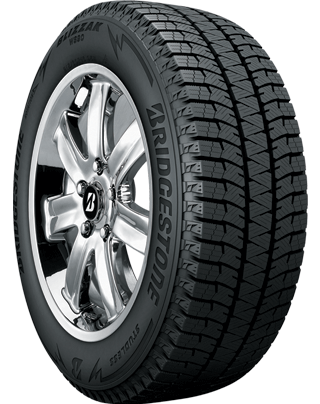
- No warranty
- Winter
- Winter
 Ecopia EP422 Plus
Ecopia EP422 Plus
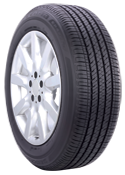
- Platinum Pact Limited Warranty
- All-Season
- Performance
 DriveGuard Plus
DriveGuard Plus
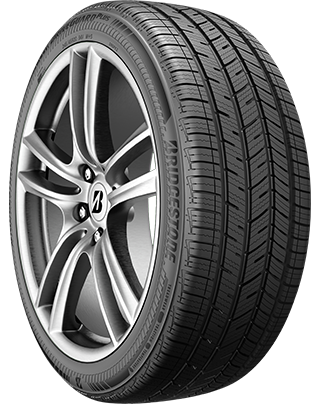
- Platinum Pact Limited Warranty
- All-Season
- Performance
 Turanza QUIETTRACK
Turanza QUIETTRACK
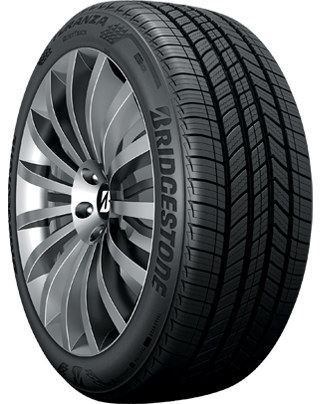
- No warranty
- All-Season
- Performance
 WEATHERPEAK
WEATHERPEAK
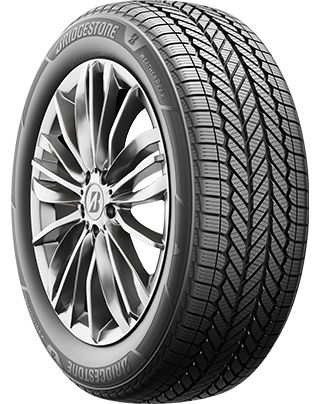
- Platinum Pact Limited Warranty
- All-Season
- Passenger Tires
 Potenza Sport AS
Potenza Sport AS
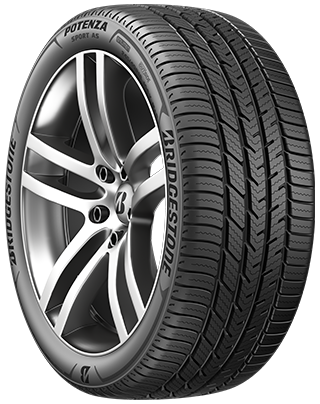
- Platinum Pact Limited Warranty
- All-Season
- Performance
 Turanza LS100
Turanza LS100
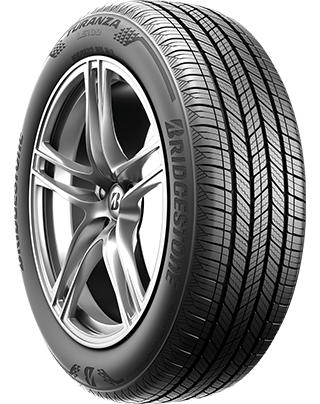
- Platinum Pact Limited Warranty
- All-Season
- Performance
 Turanza T005A
Turanza T005A
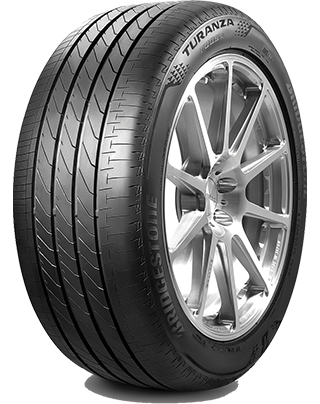
- No warranty
- Summer
- Performance
 ALL SEASON
ALL SEASON

- No warranty
- All-Season
- Passenger Tires
 WEATHERGRIP
WEATHERGRIP
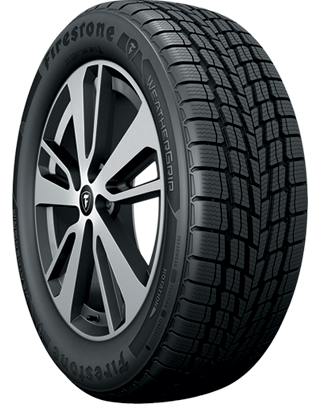
- No warranty
- All-Season
- Passenger Tires
 Winterforce 2
Winterforce 2
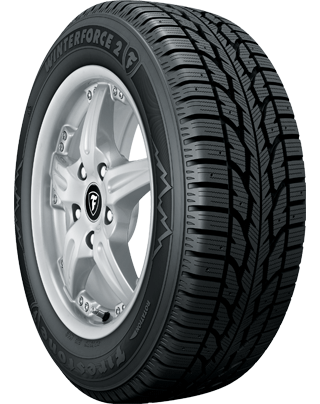
- No warranty
- Winter
- Winter
 Firehawk AS V2
Firehawk AS V2
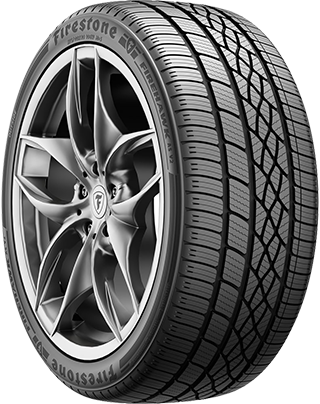
- No warranty
- All-Season
- Performance
 Firehawk Indy 500
Firehawk Indy 500
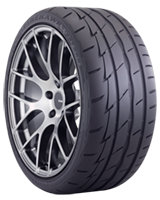
- Gold Pledge Limited Warranty
- Summer
- Performance

- No warranty
- All-Season
- Passenger Tires

- No warranty
- All-Season
- Passenger Tires
 Extensa A/S II
Extensa A/S II

- No warranty
- All-Season
- Passenger Tires
Choosing 2011 Toyota Camry Tires
Other than getting the proper tire size, there are a couple of other factors to consider when buying Toyota Camry tires like how and where you drive, and how much you want to spend. When evaluating your driving conditions, think about where you live (countryside vs. city vs. mountains) and the kind of unexpected weather you're likely to experience. Drivers in states that fully experience all four seasons often buy two sets of tires: one for winter and one for summer. Other drivers buy one set of all-season tires instead. That way they don't have to return to the tire shop and their vehicle is always ready for sun, rain, and light snow!
Driving style is next on the list to think about when buying tires. If you're a diehard off-roader, you have very different tire needs than a highway commuter who doesn't leave the paved path. Browse Toyota Camry tires online or come to your nearby Firestone Complete Auto Care for help selecting the tire that's right for you.
Installing Toyota Camry Tires
Firestone Complete Auto Care installs more tires on more cars than most other companies. We're a tire store that also offers professional tire installation, maintenance, and rotation, along with complete auto care. Shop 2011 Toyota Camry tires online and schedule an installation appointment.
2011 Toyota Camry Tire Q&A
-
Why check Toyota tire inflation? The right tire pressure can make all the difference. Proper tire inflation helps increase fuel economy, improve braking time, and boost tire lifespan! Even a small change in tire pressure can impact your driving.
-
Why are there numbers on the side of my Toyota Camry tires? Your tire sidewall gives you information about load carrying capacity, speed rating, treadwear, traction, and tire size. Talk to one of our tire technicians to learn how to read the numbers on your tire!
-
How do I check the tread depth on my Toyota tires? Stay on top of your tire tread depth to help avoid a dangerous drive. You can check tread depth with a penny. Hold the penny so that Abraham Lincoln is facing you, then place your penny into a tread groove upside down. If you can see the top of Abe’s head, your tread is shallow and it might be time for new Toyota Camry tires. Grab a penny. Hold the so that Abe Lincon's head is facing you and his hair is pointing toward the ground. Then, place the penny into a tread groove. If you can see the top of Abe’s head, your tread is shallow and it might be time for new Toyota Camry tires.
2011 Toyota Camry Repair
How do I learn more about auto repairs? Click on a service below to read about the types of Toyota Camry repairs we do at Firestone Complete Auto Care.
Get Repairs for Your 2011 Toyota Camry
For most drivers, the words “car repair” don’t exactly spark excitement. But we work to provide you with a different experience at Firestone Complete Auto Care. When you come to us for 2011 Toyota Camry repair services, our skilled repair technicians will get your Camry back on the road. Before we begin any repair work, we’ll diagnose any issues and answer your questions about potential repair options. We’ll never recommend a repair we don’t think is necessary for your safety or the performance of your Toyota.
What Will Toyota Camry Repairs Cost?
Several factors can affect the cost to repair your 2011 Toyota Camry, including what kind of repair you need, prices of appropriate replacement parts, how much labor the repair will take, and where you live. No matter what state you’re in, be sure to look through our offers and online coupons for repairs.
A few different aspects can influence repair costs for your 2011 Toyota Camry, like
2011 Toyota Camry Auto Repair Questions
-
Can scheduled maintenance help me avoid repairs? The cheapest 2011 Toyota Camry repair is the one that isn’t necessary in the first place! Staying up-to-date with your car’s scheduled maintenance services is a great way to keep future repair costs low.
-
What's wrong if something feels 'off' in my Toyota? You know your vehicle. You also know when something feels 'off' with your vehicle. Pay attention when things don't run like they used to and stop by for a Courtesy Check when you notice an unusual sign, smell, or sensation. We might be able to help you prevent Toyota Camry repairs!
-
Why do you recommend certain repairs for my Toyota? Talk to your technician. We'll never recommend a service or repair for your 2011 Toyota Camry that we don't think is necessary for your safety.
Get Your 2011 Toyota Camry Brakes Fixed
Your Toyota Camry may be powered by a strong engine. But if you can't stop it, then it's scrap metal. If you notice your brakes are squeaking or not working well, don’t wait! Safe driving and responsive brakes go hand in hand. Plus, ignoring your brake problems can result in more damage and higher brake repair bills. Get your 2011 Toyota Camry brakes fixed at Firestone Complete Auto Care. Our brake repair services include brake pad/shoe removal and replacement, rotor/drum resurfacing, brake fluid exchange, and wheel cylinder and brake caliper installation.
Toyota Camry Brakes Questions
-
What can cause my Camry to shake when I apply the brakes? Your Camry could shake when you brake due to worn brake pads or rotors, warped rotors, loose or worn suspension components, or faulty brake calipers. You can always schedule a free brake inspection at the first sign of strange brake behavior.
-
What is the average lifespan of Camry brake pads? In general, brake pads can last from 30,000 to 40,000 miles. Certain factors, like driving on highways mostly and braking smoothly, can help your brake pads last longer. Hauling heavy loads and riding your brakes can shorten brake pad lifespan.
-
Does brake fluid leak when the car is off? Your Camry brake system is a closed hydraulic system, so a brake fluid leak likely means you have an issue in your brake system. Over time, brake components can wear out or get damaged, causing a brake fluid leak.
2011 Toyota Camry Drivetrain Repairs
Drivetrains for front, rear, and all-wheel-drive and 4WD vehicles are not all the same. You don't want to go to any random shop for drivetrain repair. You want to come see the technicians at Firestone Complete Auto Care. We can help repair all of your 2011 Toyota Camry drivetrain components Your Toyota could be crying out for driveshaft repair if you notice heavy vibrations in your floorboards, clunks when shifting, resistance when turning, or vibration as your vehicle accelerates.
2011 Toyota Camry Drivetrain Questions
-
How do I know if my Toyota drivetrain is damaged? Hear noises toward the back of your Toyota Camry? See fluid leaking? Having issues turning? These could all be signs of drivetrain damage you don't want to ignore. Take action quickly to catch repairs or replacements before something more severe happens.
-
What triggers the malfunction indicator light (MIL) in a Camry? A multitude of problems can activate your Camry’s malfunction indicator light (better known as the check engine light), including issues with the engine, transmission, sensors, electrical system, or connectors.
-
How worried should I be about a drivetrain malfunction in my Camry? A drivetrain malfunction in your Camry should never be taken lightly. Driving with a malfunctioning drivetrain can put you in danger and lead to further vehicle damage, so it's essential to have a qualified mechanic assess and repair the problem as soon as possible.
2011 Toyota Camry Alignment Services
An alignment involves making adjustments to your Toyota Camry's suspension system, the connection between the vehicle and the wheels. When your car has an alignment service, the individual angles of your tires are adjusted so that they come into contact with the road in just the right way — the way Toyota intended them to. Bring your 2011 Toyota Camry in for a wheel alignment and we'll start with an alignment check. After that, we can adjust your wheel alignment angles until they match Toyota’s recommended measurements.
Toyota Camry Alignment Questions
-
What can knock my Toyota Camry out of alignment? Hitting a pothole or curb can alter your wheel alignment. So can general wear and tear over time.
-
When should you get a wheel alignment for your Camry? Check your Camry owner's manual for Toyota's recommended interval. It's generally a good idea to check your alignment every 6,000 miles or 6 months, depending on which comes first.
-
Do you need an alignment with new Camry tires? You likely aren't required to get an alignment when you put new tires on your Camry, but it's a super smart idea! An alignment can help ensure optimal tire wear, fuel efficiency, and handling. Still, you should reference your Camry owner’s manual for what’s recommended.
2011 Toyota Camry Engine Repair
When your Toyota Camry engine needs repairs, our technicians will make sure you understand what’s going on before they start working on your engine. We never do any work without your sign-off. If a repair isn’t urgent right now, we’ll let you know. We'll also tell you if it's necessary for your safety. We want to give you all the details you need to make an informed decision about your engine repairs. By choosing Firestone Complete Auto Care for Camry engine repairs and you can drive easy knowing that we use Toyota-approved parts and fluids — serpentine belt, motor oil seal, sensors, or another part.
Engine Q&A 2011 Toyota Camry
-
Why does my Camry’s check engine light come on when I start it? It’s usually normal for your check engine light to turn on upon ignition. This is just your Camry testing its circuits. The dash light shouldn't stay on. If it does, you might want to bring your vehicle in for service.
-
Why is my Toyota Camry making engine noise? Unusual noises can signal a problem with your Toyota Camry engine. Tapping or knocking could mean you're low on oil. Whistling could mean a belt is misaligned or there's an intake leak. Squealing can indicate a loose fan belt, and grinding might be coming from the brakes, not the engine.
-
Are you unknowingly damaging your Toyota Camry engine? Some driving habits are not so great for your engine. These include driving on a near-empty gas tank, flooring the gas pedal while the car is in Park, or accelerating too quickly, too soon. Protect your engine’s performance and efficiency by distancing yourself from these habits.
Get Your Toyota Camry Tire Repaired
If your 2011 Toyota Camry is in need of a tire inspection or possible flat tire repair, Firestone Complete Auto Care has your back. In some cases, a tire doesn’t have to be replaced – it can be plugged and patched with a simple repair. Depending on the damage, though, a repair might not be the right move. Our technicians can determine which option is best for your situation. To start, we’ll consider the location of tire damage, the type of issue, the size and scope of the damage, and the amount of wear on your tires.
If we determine that your 2011 Toyota Camry tire can be safely repaired, we’ll get to work on the steps to fix it: (1) Remove the tire from the wheel for inspection and repair, (2) fill the puncture to keep the moisture out, and (3) seal the inner liner with a repair unit to prevent air loss.
Your Questions About Toyota Camry Tire Repair, Answered
-
How soon should I have my flat tire repaired? Driving on a flat tire is not a good idea. Your Camry engine will keep running with a flat tire, but you could damage your wheel by continuing to drive on a flat.
-
Can I use an emergency/temporary sealant to fix my Toyota's flat tire? A temporary sealant may be able to help you get to a repair location safely. But temporary or emergency sealants could possibly damage TPMS sensors, and in some cases may even void the warranty on your Bridgestone or Firestone tires. If your tire needs extensive repair, sealant can add time and labor costs to the process.
-
What is causing the tires on my Camry to keep losing air? Possible reasons for your Camry tires continuously losing air include a leaking valve steam, wheel damage, and a puncture or hole in the rubber.
Maintenance for Your 2011 Toyota Camry
When it comes to your Toyota Camry, how you treat your car makes all the difference in its performance. With proactive maintenance, your Camry could be on the road well past the 200,000 mile mark.
2011 Toyota Camry Maintenance Schedule
What is the manufacturer recommended maintenance schedule for a 2011 Toyota Camry? Find maintenance info for your vehicle.
About 2011 Toyota Camry Scheduled Maintenance
It can be overwhelming, but fortunately, there’s a resource that takes the guesswork out of routine Camry maintenance. Rely on the recommended maintenance schedule that’s been created just for your 2011 Toyota Camry! This recommended maintenance schedule is written by the auto manufacturer, Toyota themselves. Driving conditions, climate variations, and other variables can affect which scheduled maintenance services you’ll need; in most cases, though, recommended maintenance will consist of services like oil changes, tire rotations, brake pad replacement, filter changes, and fluid checks and exchanges. Keeping up with routine service appointments is a great way to keep your Camry running for longer, keep you safer on the road, and maybe even save you the headache of dealing with common 2011 Toyota Camry problems in the future.
Essential Maintenance to Keep Your 2011 Toyota Camry Running Newer, Longer
Come to Firestone Complete Auto Care for manufacturer-recommended routine maintenance on your 2011 Toyota Camry and an expert technician will begin by performing a Courtesy Check. The Courtesy Check helps us see what we’re working with under the hood, and allows us to alert you to any potential problems before they worsen. During a Courtesy Check, we’ll always check your battery, then we’ll move on to inspect your Camry’s head and tail lights, tires, fluid levels, alignment, and windshield wipers.
Firestone Complete Auto Care is your one-stop shop for 2011 Toyota Camry maintenance and repairs. Don’t wait until something goes wrong with your car. Visit your nearest location for proactive maintenance today.
Questions About 2011 Toyota Camry Maintenance
-
What should I do after hitting a pothole in my Toyota Camry? Watch out for pothole damage. If your 2011 Camry is pulling to one side or the other, your tires or suspension system could be calling out for help.
-
When should I switch my Toyota Camry to high mileage oil? If your Toyota Camry has ticked past 75,000 miles, consider switching to high mileage oil at your next oil change to give your engine what it needs to go another 75,000 (or more!). High mileage oil: make it a high priority!
-
Can I ignore dashboard lights on my Toyota? Don't ignore dashboard warning lights! Bring your Toyota Camry in for a diagnostic code scan as soon as a dashboard warning light flashes on, whether it's your check engine or battery light. Dashboard lights alert you to trouble under the hood.
Battery Size & Replacement for 2011 Toyota Camry
Not sure what battery to get for your Toyota Camry?
| Battery | Engine | Warranty | Cold Cranking Amps | |
|---|---|---|---|---|
| 24F-3 | V6/3.5L | Replacement 24 months | Performance months | 650 |
| 24F-3 | V6/3.5L | Replacement 24 months | Performance months | 650 |
| 35-2 | V6/3.5L | Replacement 36 months | Performance months | 640 |
| 35-2 | V6/3.5L | Replacement 36 months | Performance months | 640 |
| 24F-RP | V6/3.5L | Replacement 48 months | Performance months | 750 |
| 24F-RP | V6/3.5L | Replacement 48 months | Performance months | 750 |
| 24F-3 | L4/2.5L | Replacement 24 months | Performance months | 650 |
| 24F-3 | L4/2.5L | Replacement 24 months | Performance months | 650 |
| 24F-6 | L4/2.5L | Replacement 36 months | Performance months | 750 |
| 24F-6 | L4/2.5L | Replacement 36 months | Performance months | 750 |
| 24F-RP | L4/2.5L | Replacement 48 months | Performance months | 750 |
| 24F-RP | L4/2.5L | Replacement 48 months | Performance months | 750 |
2011 Toyota Camry Batteries
The average car battery lasts three to five years. You want to replace your 2011 Toyota Camry battery before it fails and leaves you stranded. Watch for signs that your current battery is getting too old or too weak. A slow engine crank, an illuminated battery or check engine light, bloated battery case, corrosion-covered posts, or faded headlights can all be signs that your battery is waving goodbye.
Or, you can get a complimentary battery check at your nearest Firestone Complete Auto Care. Stop by for a free battery test and, if necessary, a battery replacement to help keep your 2011 Toyota Camry running! Car batteries are one of our many specialties! Our technicians are familiar with Toyota-specific recommendations for Camry battery CCAs and reserve capacity. Get help figuring out the battery size that matches your vehicle, and schedule a weekday or weekend battery replacement service for your car.
Commonly Asked Toyota Camry Battery Questions
-
Why won’t my Toyota Camry battery hold a charge? A car battery that needs to be jump-started every time is as good as dead. It may be getting old. Or, you’ve been leaving the doors slightly open and the dome lights on during the night. Stop in for a free battery check at your nearest Firestone Complete Auto Care and learn more about your battery's charge.
-
How long can I expect my car battery to last? The typical 12-volt car battery may last three to five years, depending on the type of battery, the driving conditions, and how well the battery is maintained.
-
What is the white, crusty stuff around my Camry’s battery post? The white, flaky stuff that can build up around your Camry’s battery terminals is known as corrosion. Acid leaking from your vehicle’s battery post can have a chemical reaction with the air, leading to an accumulation of the white, powdery substance over time. Corrosion can affect the flow of electricity between your battery and the electrical system in your Camry, possibly causing issues with electrical performance and starting. If left unaddressed for long enough, it may even cause your battery to prematurely fail.
2011 Toyota Camry Oil Change Service
Your 2011 Camry’s oil should be changed according to Toyota’s recommended oil change intervals. Outside of Toyota-recommended oil change intervals, your Camry may need an oil change if your check engine light is on, you hear knock knock knock coming from the engine, smell oil inside the car, or notice excess vehicle exhaust. You may also need an oil change more frequently than Toyota recommends if you haul heavy loads, drive in dusty terrain, adventure off-road, or go at low speeds on long distance trips.
Whether it’s synthetic, conventional, or a blend of both — your local Firestone Complete Auto Care has the right oil for your Toyota Camry. Talk with a teammate and consult your owner's manual before picking a motor oil. At Firestone Complete Auto Care, you can choose from the following oils: Quaker State® Advanced Durability™ conventional oil, Pennzoil® High Mileage Vehicle® motor oil, Pennzoil Platinum® Full Synthetic motor oil with PurePlus™ Technology, and Shell Rotella® heavy-duty engine oil. In an oil change service, a technician will change your Camry's oil, replace and recycle your used oil and oil filter, inspect all of your other filters, refill vital car fluids, and perform a courtesy inspection on your entire vehicle. Make an appointment for an oil change service today and let the oil experts take care of your Camry's engine.
2011 Toyota Camry Oil Change Q&A
-
What can cause the oil light on my Toyota Camry to illuminate? Your Toyota Camry oil change reminder light may come on if you're overdue for an oil change. The oil pressure light will typically come on if the oil level in the engine is too low, the oil pump is failing, you have a clogged oil filter, or there's a faulty oil pressure sensor.
-
How hard is it to change Toyota Camry oil at home? Changing engine oil at home isn’t as simple as it’s made out to be. You’ll have to figure out how to properly dispose of the oil and buy special tools. Having your oil changed professionally can not only reduce the risk of something going wrong during the service, but it’ll also help your car perform smoothly down the road.
-
Why is my Toyota Camry spewing blue or gray exhaust smoke? You could have an oil leak and have a case of burning oil. Looks like it’s time for a professional to take a look. The leak could be the result of worn valve seals, fried piston rings, or old cylinder walls.
Engine Tune-Up Service for Your 2011 Toyota Camry
Regular engine tune-ups can optimize your Camry’s power on the road. The Firestone Complete Auto Care location in your community offers several Toyota Camry engine tune-up services. One option is the standard Firestone Tune-Up. It includes a complete visual inspection of engine components, installation of new spark plugs, and a lifetime warranty on parts*. A second service option replaces the air and fuel filter in your Camry. The third tune-up option is a fuel system cleaning service, which is a three-step process that removes varnish, dirt, and carbon deposits on your Camry's fuel injectors, throttle body, and throttle plate. This goes a long way in boosting your fuel system’s overall performance. Keep in mind that your Camry's mileage and maintenance history can uniquely impact its tune-up needs. Ask one of our technicians what your vehicle needs, based on your driving habits and your car’s current condition.
*Ask a Firestone Complete Auto Care teammate about full terms and conditions for warranties.
Common Engine Tune-Up Q&A for 2011 Toyota Camry
-
When should Toyota Camry spark plugs be replaced? Replace spark plugs on time or about every 30,000 miles or so. Without the spark of electricity created by spark plugs, your engine doesn’t have the combustion it needs to start — which could leave you stranded on the road. Always replace your spark plugs on time based on Toyota’s recommendations.
-
What do I do if I see a pool of liquid under my Toyota Camry? Don't ignore puddles of fluid under your Toyota Camry. It could signal a coolant leak, brake fluid leak, or an oil leak. Let any one of these leaks linger and it could cause engine damage.
-
How often should I clean my Toyota Camry fuel injectors? There is no hard and fast rule on how often fuel injectors should be cleaned, and it can vary based on driving habits and fuel type. Some manufacturers may suggest including a fuel system cleaning in your regular maintenance schedule. Or you may need to clean your fuel injectors as needed if you notice signs of a fuel system problem.
Suspension Service & Repair for 2011 Toyota Camry
When you first drove your 2011 Toyota Camry, the ride was probably so smooth that you didn’t even think about it! Lately, though, your ride’s been feeling a little bumpy. Maybe your Camry bounces, pulls to one side, or makes a weird sound when you drive over a speed bump or turn. The first sign of problems is a good time to bring your 2011 Toyota Camry in for steering and suspension repairs. We’ll get to the source of your car problems and, if steering and suspension service is needed, we’ll go over the services you need and how much they will cost before we do any work.
2011 Camry Steering & Suspension Q&A
-
Why does my Toyota Camry bounce so much? Damaged struts or shocks can't dampen road bumps properly, causing your vehicle to feel like a trampoline after each dip or bump.
-
Why does my Camry's nose dive down when I hit the brakes? When you brake, the forward momentum combined with your vehicle's weight sends a lot of force to the vehicle's front end. A bad suspension can cause all that weight and force to push the front end downward.
-
What role do tire pressure and tread depth play in my Toyota's suspension? Maintaining your tires can help reduce strain on the suspension, nd also let you know when it's time to replace your tires. A faltering steering and suspension system could lead to uneven tire wear.
Convenient & Local 2011 Toyota Camry A/C Service
Our technicians will work to solve your 2011 Toyota Camry A/C problems to the best of their ability. During this initial A/C performance check, we’ll look at the state of your 2011 Toyota Camry’s A/C system to determine whether repair work is needed. This check includes a visual inspection, performance test, and pressure and leak test.
While your 2011 Toyota Camry’s air conditioner is being serviced, we’ll also do an A/C evacuation and recharge. To start this process, a technician will flush out the old refrigerant from your vehicle’s A/C system. Then, they’ll use Toyota’s specifications to evacuate the system. Finally, we’ll recharge the A/C system with new refrigerant.
2011 Toyota Camry A/C System FAQs
-
Why do I get hot air from my Camry A/C? An A/C blowing hot air has several possible root causes. There could be an issue with your compressor clutch, a blown fuse, a leak, or a clog in the expansion valve.
-
What can cause an A/C system leak? Over the years, the rubber seals and gaskets in your Camry’s A/C system naturally degrade. Moisture can get into the system and cause a malfunction, or parts can simply wear out so that your system no longer seals properly.
-
Why won’t my Camry’s A/C cool the vehicle when the car is stopped? If your A/C only works when the vehicle is moving, there could be a problem with part of your Camry’s A/C or electrical system. Potential issues include low coolant or a faulty cooling fan.
2011 Toyota Camry Transmission Service
Your transmission carries power from the engine to the wheels so that you can drive at the speed you desire. Because of the transmission’s responsibility to translate the right dose of power into the right amount of speed, even the smallest transmission problems should be addressed right away. 2011 Toyota Camry transmission problems can show up as shifting delays, grinding or jumping during acceleration, a feeling of shakiness, or a burning smell or whistling sounds coming from under the hood. Let Toyota Camry transmission problems linger and you might notice your fuel economy decrease or discover that your Camry’s not even driveable. Our technicians are trained to service 2011 Toyota Camry transmission systems according to vehicle manufacturer recommendations. Schedule an appointment at your local Firestone Complete Auto Care at the first sign of transmission problems to help diagnose, treat, and prevent major transmission issues.
2011 Toyota Camry Transmission Q&A
-
When should I have my Camry's transmission fluid checked or exchanged? Regularly checking and exchanging your 2011 Camry’s transmission fluid is one of the best ways to help the transmission system perform. Some technicians would say that between 30,000 and 60,000 miles is a good timeframe for having your Toyota's transmission fluid checked and replaced, but that timeline can vary depending on how your vehicle is used and your manufacturer’s recommendations. The good news is that transmission fluid leaks are affordable to repair and easy to spot.
-
Can transmission fluid leak from my Toyota Camry? Over time, transmission fluid can leak from your Toyota Camry, potentially causing transmission problems. A transmission fluid leak may be caused by a damaged transmission pan, faulty transmission cooler lines, worn-out seals, a cracked transmission housing, or an overfilled transmission.
-
Can I drive my Toyota Camry with a transmission fluid leak? You should avoid driving with a transmission fluid leak. Your transmission system relies on transmission fluid to operate properly, and a leak may decrease performance, cause your Camry to overheat, or even lead to transmission failure.
Get a 2011 Toyota Camry Vehicle Inspection
At Firestone Complete Auto Care, we perform a multi-point Courtesy Check during any vehicle service. The technician will begin by testing your Toyota Camry's battery to find out how much charge is remaining on it. The check will continue with a visual inspection of your Toyota Camry's filters, lights, wiper blades, alignment, tires, hoses, belts and fluid levels.
While every visit to your local Firestone Complete Auto Care includes a Courtesy Check, you can also request a Complete Vehicle Inspection for your 2011 Toyota Camry if you suspect there may be a bigger problem. A Complete Vehicle Inspection includes everything in a Courtesy Check, plus an examination (by hand!) of your exhaust system, steering and suspension, and brakes. This inspection is aimed at informing you of any major problems that could require preventative maintenance.
Depending on your location, you may be able to complete your vehicle’s safety tests or state inspection at your nearest Firestone Complete Auto Care. Specific requirements for these types of inspections vary by state.
FAQs for 2011 Toyota Camry Vehicle Inspections
-
When does my Toyota Camry need an inspection? It needs a check-up if something feels 'off' to you, the driver. Your Toyota Camry could benefit from a Courtesy Check if it has any illuminated dashboard lights, you hear weird noises coming from any part, the engine doesn't start sometimes, or your vehicle pulls to one side.
-
Help! My 2011 Toyota Camry failed the state inspection test. Can you get it to pass? Did your vehicle fail a recent state inspection test? We can help. Come in for a checkup and we’ll diagnose the issue.
-
What's the ideal timing for a full vehicle inspection on my Toyota Camry? The best time to get a complete vehicle inspection for your Toyota Camry is before going on a road trip for the peace of mind. Another great time is when something abnormal occurs, and you can't pinpoint the issue. You might notice new dashboard lights, hear strange noises from under the hood, or your steering wheel doesn't feel like it once did.
2011 Toyota Camry Radiator Repair & Service
Staying on top of routine radiator maintenance for your 2011 Toyota Camry is a huge factor in the longevity of your engine. To keep your radiator functioning, Toyota recommends replacing your antifreeze or coolant at scheduled intervals but it’s a good idea to keep your eyes open for any indication that your radiator is failing. You might be driving around (or about to be stranded) with a failing radiator if you notice leaking coolant, overheating, or an illuminated low coolant dashboard light.
If you bring your vehicle to Firestone Complete Auto Care, we start with a comprehensive inspection of your Toyota Camry’s cooling system. We then do a machine-powered radiator exchange, replenish flushed chemicals, sealants, and lubricants, and then pressure check for leaks. When it comes to radiator service and repair, your 2011 Toyota Camry is in good hands at Firestone Complete Auto Care.
2011 Toyota Camry Radiator Q&A
-
What does an illuminated coolant temperature light mean for my Toyota? Pay attention to the temperature gauge and lights on your dashboard. If a low coolant warning light comes on or your dashboard temperature gauge keeps rising, it’s likely that your engine is about to overheat (and could leave you stranded on the road). Wait for the engine to cool down, then have your coolant system checked immediately at your nearest Firestone Complete Auto Care.
-
My Camry overheated! What can cause that? If your Toyota Camry engine overheats, it could be because of a clogged radiator, a damaged thermostat, a faulty cooling fan, a malfunctioning water pump, or low coolant levels.
-
What is making my Camry radiator sound like it’s boiling or rumbling? Air pockets in your Camry’s cooling system may cause a rumbling or boiling noise. You could also have a clogged radiator or simply need to replace the radiator cap.